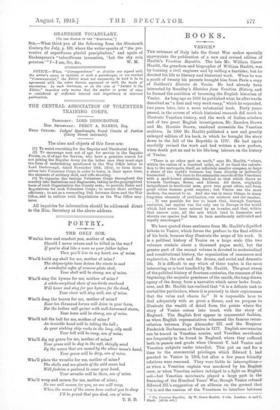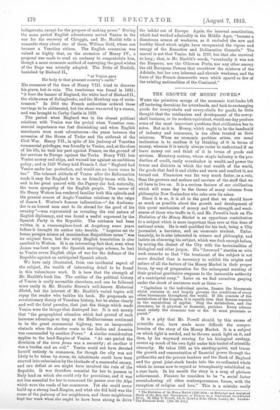BOOKS.
VENICE.* THE entrance of Italy into the Great War makes specially appropriate the publication of a new and revised edition of
Hazlitt's Venetian ,Republic. The late Mr. William Carew Hazlitt, the grandson and biographer of William Hazlitt, was by training a civil engineer and by calling a barrister, but he devoted his life to literary and historical work. When he 'ens a youth of twenty his parents brought him from Paris a copy
of Galibert's Histoire de Venise. He had already been interested by Smedley's Sketches from Venetian History, and he formed the ambition of becoming the English historian of Venice. As long ago as 1858 he published what he afterwards described as " a first and very weak essay," which he expanded, two years later, into a more substantial book. Forty years, passed, in the course of which historical research did much to illustrate Venetian history, and the work of Italian scholars and of two great English investigators, Mr. Rawdon Brown and Mr. Horatio Brown, rendered accessible the Venetian archives. In 1900 Mr. Hazlitt published a new and greatly enlarged edition of his book, in which he brought the story down to the fall of the Republic in 1797. He bad again carefully revised the work and had written a new preface, when death put an end to his life-long labours on the history of Venice.
"There is no other spot on earth," says Mr. Hazlitt, "where, within the radius of a hundred miles, or, if we limit the calcula- tion to the metropolis itself, an infinitely smaller compass, so largo a share of the world's business has been directly or indirectly transacted.. . . We turn to the attainable records of the Venetians with a spell-bound attention, kindred to that which draws us towards Carthage, Rome, and Athens. All these, originally insignificant in territorial area, grew into great cities, and from great cities became great empires ; but Venice was the most modern, the nearest to us. And she was in many things, in many forgotten elements of civilization, our mistress and our teacher. . . . It was possible for her to boast that, through fourteen centuries, her capital was the only one in Europe or the world which had never been entered by an invader, and that, within that narrow zone, all the arts which tend to humanize and elevate our species had been in turn assiduously cultivated and royally encouraged."
We have quoted these sentences from Mr. Ila,zlitt's dignified tribute to Venice, which forms the preface to the final edition of his book, because they illustrate the scope of his work. It is a political history of Venice on a large scale (the two volumes contain about a thousand pages each), but the greater part of the second volume is devoted to ecclesiastical and constitutional history, the organization of commerce and exploration, the arts and the drama, and social and domestic life. It is difficult to say which of these topics is the most interesting or is best handled by Mr. Hazlitt. The great sweep of the political history of fourteen centuries, the romance of the beginning, the majestic greatness of the zenith, the long-drawn agony of the decay, form a narrative which never lacks fresh-
ness, and Mr. Hazlitt has realized that " it is a delicate task to curtail the particulars, where it is precisely in their copiousness that the value and charm lie." It is impossible here to deal adequately with so great a theme, and wo propose, to illustrate the wealth of detail from the points where the story of Venice comes into touch with the story of England. The English first appear in ornamental fashion, as when English representatives witnessed the famous recon- ciliation between Pope Alexander III. and the Emperor Frederick Barbarossa. at Venice in ]177. English mercenaries can be traced in Venetian armies, and Venetian merchants are frequently to be 'found in England, where they suffered both in person and goods when Clement V. laid Venice and Venetian subjects under interdict. This put an end for a time to the commercial privileges which Edward I, had granted to 'Venice in 1304, but after a few years friendly relations were resumed. They were liable to interruptions— as when a Venetian captain was murdered by his English crew, or when Venetian sailors indulged in a fight on English soil—but Venetian merchants played a large part in the
financing of the Hundred Years' War, though Venice refused Edward suggestion of an alliance on the ground that " it is not the custom of the Venetians to interfere between
• The Venetian &public. By IV. Curow Hazlitt. 2 vols. London: A. and C. Black. [B2 2e. net.
belligerents, except for the purpose of making peace." During the same period English adventurers served Venice in the war for the recovery of Chioggia, and Mr. Hazlitt tells a romantic story about one of them, William Gold, whose son became a Venetian citizen. The English connexion was valued so highly that, on the accession of Henry IV., a proposal was made to send an embassy to congratulate him, though a more economic method of conveying the good wishes of the Doge was actually adopted. The Duke of Norfolk, banished by Richard IL, " at Venice gave His body to that pleasant country's earth."
His successor of the time of Henry VIII. tried to discover his grave, but in vain. The tombstone was found in 1682 ; "it bore the banner of England, the white hart of Richard II., the white swan of Bolingbroke, and the Mowbray cap of main- tenance." In 1810 the French authorities ordered these carvings to be obliterated, but the stone was saved by a mason, and was brought to Corby Castle in 1839.
The period when England was in the closest political relations with Venice was the period when Venetian com- mercial importance was fast diminishing and when English merchants were most adventurous—the years between the accession of the House of Tudor and the outbreak of the Civil War. Henry VII., in spite of his jealousy of Venetian commercial privileges, was friendly to Venice, and, at the close of his life, he took her part against France, on the ground of her services to Europe against the Turks. Henry VIII. lent Venice money and ships, and warned her against an ambitions policy; and in 1526 Wolsey told Francis I. that "England had Venice under her protection, and would see no harm come to her." The tolerant attitude of Venice after the Reformation made it easy for England to be on friendly terms with her, and in her great quarrel with the Papacy she had, naturally, the warm sympathy of the English people. The career of Sir Henry Wotton has rendered familiar both this episode and the general course of Anglo-Venetian relations in the reign of James I. Wotton's famous indiscretion—" An Ambassa- dor is an honest man sent to lie abroad for the good of his country"--was represented as revealing the real nature of English diplomacy, and was found a useful argument by the Spanish Party in the Republic. The sentence had been written in a commonplace-book at Augsburg some years before it brought its author into trouble. " Legatus est vir bonus poregre missus ad mentiendum Reipublicae calm" was its original form, but the witty English translation is also ascribed to Wotton. It is an interesting fact that, even when James was bent upon the Spanish marriage scheme, he lent to Venice seven English ships of war for the defence of the Republic against an anticipated Spanish attack.
We have only illustrated, from one incidental aspect of the subject, the wealth of interesting detail to be found in this voluminous work. It is here that the strength of Mr. Hazlitt's book lies. The outline of the political history of Venice is easily accessible elsewhere, and can be followed more easily in Mr. Horatio Brown's well-known Historical Sketch, but the interest of Mr. Hazlitt's varied topics will repay the reader who tackles his book. He propounds no revolutionary theory of Venetian history, but he states clearly and well the fatal paradox, that just the things which made Venice were the things that destroyed her. It is not merely that "the geographical situation which had proved of such immense advantage so long as the Mediterranean continued to be the great commercial highway, was an insuperable obstacle when the shorter route to the Indies and America was commanded by another Power." A similar consideration applies to the land-Empire of Venice. " At one period the dominion of the terra firma was a necessity ; at another it was a burden and an evil." Venice could not have devoted herself entirely to commerce, for though the city was not likely to be taken by storm, its inhabitants could have been starved into submission by the blockade of a successful enemy, and one defeat at sea might have involved the ruin of the Republic. It was therefore essential for her to possess in Italy land on which she could rely for provisions, and it was not less essential for her to command the passes over the Alps which were the roads of her commerce. Yet she could never build up a strong laud-Empire, and what she did hold was the cause of the jealousy of her neighbours, and those neighbours kept her weak when she ought to have been strong to drive the infidel out of Europe. Again, the internal constitution, which had worked admirably in the Middle Ages, "became a disastrous source of weakness, as it excluded the new and healthy blood which might have recuperated the vigour and energy of the Executive and Deliberative Councils." The marvel is not that Venice fell in 1797, but that she survived so long ; that, in Mr. Hazlitt's words, "eventually it was not the Emperor, nor the Ottoman Porte, nor any other among the old European Powers that overthrew the mistress of the Adriatic, but her own inherent and chronic weakness, and the force of the French democratic wave which spared so few of the existing nationalities of the Continent."



































 Previous page
Previous page